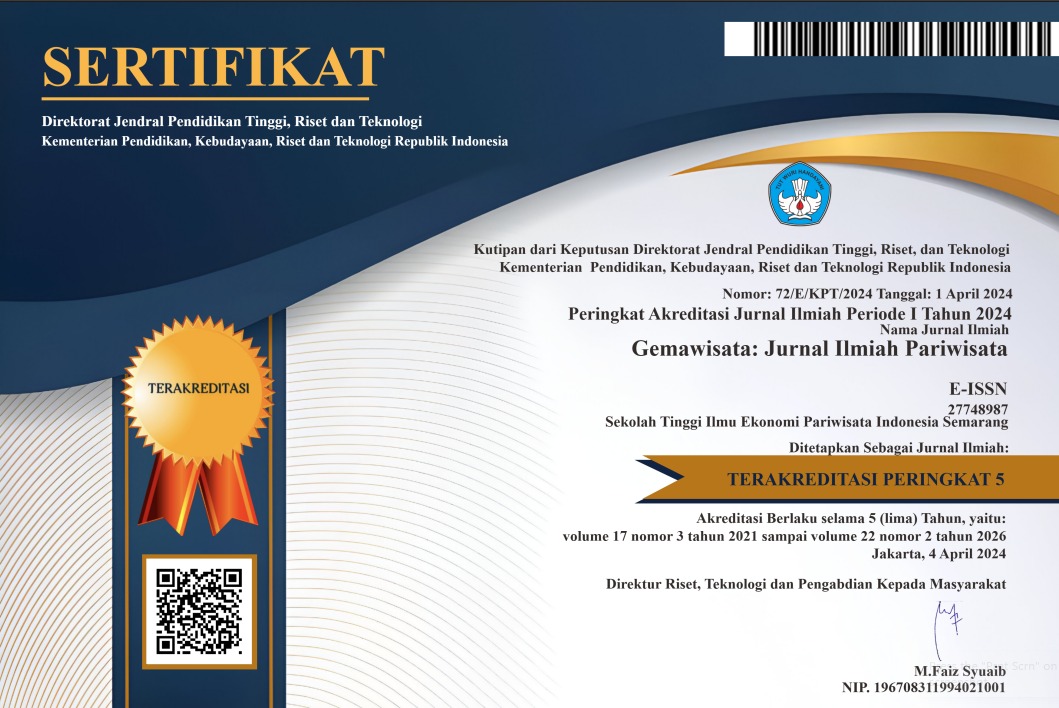Gastrodiplomasi Korea Selatan di Indonesia melalui Ekspor Produk Makanan Korea Selatan Periode 2020-2022
DOI:
https://doi.org/10.56910/gemawisata.v21i1.461Keywords:
Gastrodiplomacy, New Public Diplomacy, South Korea, IndonesiaAbstract
Gastrodiplomacy is the diplomacy used by South Korea throughout the world, including Indonesia. Diplomatic activities can basically increase the country's export activities. During the Covid-19 pandemic, South Korean export activities in Indonesia experienced a decline. Therefore, this research aims to increase exports of South Korean food products in Indonesia during the Covid-19 pandemic through South Korean Gastrodiplomacy in Indonesia. In answering these problems, the concepts of gastrodiplomacy and new public diplomacy are used. The research method used is qualitative which aims to find out in depth by exploring and understanding the central issues in the research. The aim of this research is to determine the increase in exports of South Korean food products in Indonesia during the Covid-19 pandemic through gastrodiplomacy. The results of this research are an increase in export activities of South Korean food products in Indonesia and also an increase in the number of Indonesian people's interest in Korean food which directly encourages an increase in export activities of South Korean food products to Indonesia which continues to increase every year.
References
Afriantari, R., & Putri, C. Y. (2017). Kerjasama Indonesia dan Korea Selatan dalam pengembangan. Jurnal Transborder, 1(1).
Angesti, A. R., & Purnama, C. (2024). Diplomasi budaya Korea Selatan melalui grup idola K-Pop terhadap publik Indonesia pada tahun 2020-2022. Padjadjaran Journal of International Relations, 6(1), 60. https://doi.org/10.24198/padjir.v6i1.49284
Bryman, A. (2016). Social research methodology. Oxford University Press.
China Daily. (2013). Kimchi added to UNESCO list. Retrieved May 22, 2024, from https://www.chinadaily.com.cn/culture/2013-12/06/content_17158075.htm
Choi, Y. (2020). Fun traditional Korean games. Retrieved from Korea.net: https://www.korea.net/Events/Overseas/view?articleId=14465
Cindrakasih, R. R. (2021). Dinamika globalisasi budaya Korea di Indonesia dan pola konsumsi remaja “Korean Wave” di media sosial Instagram. Jurnal Public Relations-JPR, 17-28.
Creswell, J. W., & Creswell, D. (2017). Research design: Qualitative, quantitative, and mixed methods approaches. SAGE Publications.
Cull, N. J. (2007). Public diplomacy: Lessons from the past. Figueroa Press.
Distan. (2020, April 28). Meracik empon-empon (tanaman biofarmaka). Retrieved April 12, 2024, from https://distan.bulelengkab.go.id/informasi/detail/berita/meracik-empon-empon-tanaman-biofarmaka-26
Google Trends. (2023). Explore trending. Retrieved December 27, 2023, from https://trends.google.com/trends/explore?date=2020-01-01 2020-12-31&geo=ID&q=makanan%20korea,makanan%20jepang,makanan%20china&hl=en
Hartig, F. (2014). New public diplomacy meets old public diplomacy: The case of China and its Confucius Institutes. New Global Studies, 8(3), 331-352.
Herningtyas, R. (2019). Korean gastrodiplomacy: Strategy to enhance country promotion toward Muslim countries. In International Conference on Sustainable Innovation 2019 – Humanity, Education and Social Sciences (IcoSIHESS 2019). Yogyakarta.
Im, J. (2020, July 16). The 2013 Korean food fair in Hong Kong. Retrieved May 22, 2024, from https://ap.fftc.org.tw/article/592
Juniarti, S. (2021). Analisis strategi gastrodiplomasi Korea Selatan dari segi peningkatan kunjungan wisatawan asing di Korea Selatan (2014-2019). Indonesian Journal of Global Discourse, 3(1), 20-34.
Kang, H. K. (2024, March 11). First lady’s pet project: Food diplomacy. Korea Times. Retrieved April 12, 2024, from https://www.koreatimes.co.kr
KATI. (2023). Korea Trade Statistics Promotion Agency. Retrieved December 27, 2023, from https://www.kati.net/statistics/periodPerformance.do
Kedubes Korea. (2017). UNJ K-Food Campus Festival 2017. Retrieved April 12, 2024, from https://overseas.mofa.go.kr/id-id/brd/m_2707/view.do?seq=752704&srchFr=&srchTo=&srchWord=&srchTp=&multi_itm_seq=0&itm_seq_1=0&itm_seq_2=0&company_cd=&company_nm=
Kemenparekraf. (2020, August 12). Rendang dan nasi goreng makanan terenak di dunia, daya tarik pariwisata Indonesia. Retrieved April 12, 2024, from https://www.kemenparekraf.go.id/hasil-pencarian/rendang-dan-nasi-goreng-makanan-terenak-di-d
Khoo, G. C. (2017). The globalizing Hansik campaign: A Malaysian critique. East Asian Development Network.
Kim, K. H., & Choe, Y. (2014). The Korean popular culture reader. Duke University Press.
Kim, Y. S. (1997). Impact of technology on the Korean economy. Korea Journal of Population and Development, 26(2).
KOFICE. (2022). 2021 global Hallyu trends. Seoul: KOFICE.
KOFICE. (2023). 2022 global Hallyu trends. Seoul: KOFICE.
Kwon, D. Y., Chung, K. R., Yang, H. J., & Jang, D. J. (2015). Gochujang (Korean red pepper paste): A Korean ethnic sauce, its role. Journal of Ethnic Foods.
Lusiana, Y., Widodo, H., Rukhiyat, A., & Khoirunnisa, R. (2021). Japanese government effort to preserve washoku as national culinary heritage. European Union Digital Library.
Mellisen, J. (2006). Public diplomacy between theory and practice. Palgrave Macmillan.
Naim, J., Hidayat, A., & Bustami, S. Y. (2022). Strategi gastrodiplomasi Thailand dalam sektor pariwisata untuk meningkatkan kunjungan wisatawan mancanegara (Studi kasus gastrodiplomasi Thailand di Indonesia). Indonesian Journal of Global Discourse, 4(1), 35-45.
Neuman, W. L. (2017). Metodologi penelitian sosial: Pendekatan kualitatif dan kuantitatif. PT. INDEKS.
Nihayati, A., Pertiwi, E. A., & Haripa, T. I. (2022). The analysis of South Korean gastrodiplomacy towards the increase of South Korean kimchi export. Journal of World Trade Studies, 6(2).
Ningsih, M., & Sinambela, S. (2023). Peran state actor dan non-state actor dalam gastrodiplomasi Korea Selatan di Indonesia. JoGP (Journal of Global Perspective), 1(1), 92-104.
Nye, J. S. (2004). Soft power: The means to success in world politics. PublicAffairs.
Nye, J. S. (2008). Public diplomacy and soft power. Annals of the American Academy of Political and Social Science, 619, 94-109.
Pamment, J. (2014). New public diplomacy in the 21st century: A comparative study of policy and practice. Routledge.
Pham, M. A. (2013). Food as communication: A case study of South Korea’s gastrodiplomacy. Journal of International Service, 22(1).
Putri, C. Y. (2017). Kerjasama Indonesia dan Korea Selatan dalam upaya pengembangan sektor industri kreatif di Indonesia. Jurnal Transborders, 1(1).
Ramadhan, F., Rezasyah, T., & Dermawan, W. (2019). Budaya kuliner sebagai soft power: Studi perbandingan Thailand dan Republik Korea. Insignia Journal of International Relations, 6(2).
Ratri, G. M. (2018). Global Hansik campaign as South Korea’s gastrodiplomacy in 2009-2017. Journal Universitas Muhammadiyah Yogyakarta.
Rockower, P. (2012). Recipes for gastrodiplomacy. Place Branding and Public Diplomacy, 8, 235-245.
Snow, N., & Cull, N. J. (Eds.). (2020). Routledge handbook of public diplomacy. Routledge.
Sonenshine, T., Rockower, P., Chapple-Sokol, S., & Weaver, G. (2016). Culinary diplomacy, gastrodiplomacy, and conflict cuisine: Defining the field. Washington, D.C.: Stimson Center.
The Korea Herald. (2010, July 28). How far has Hansik’s globalization come? Retrieved December 27, 2023, from https://www.koreaherald.com/view.php?ud=20100728000676
Vellycia. (2021). Beyond entertainment: Gastrodiplomacy performance in Korean drama and reality show. Communicare: Journal of Communication Studies, 8(2).
Zhang, J. (2015). The foods of the worlds: Mapping and comparing contemporary. International Journal of Communication, 9, 568-591.


1_(1).jpg)






